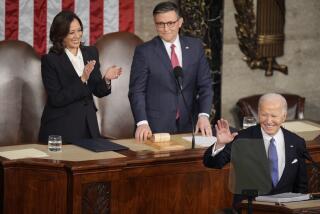Faces of the Bush Domestic Agenda
- Share via
WASHINGTON — Twenty-one years ago, President Ronald Reagan invited Lenny Skutnik to sit next to First Lady Nancy Reagan in the House gallery during the State of the Union address. Two weeks earlier, Skutnik had dived into the icy Potomac River to rescue a passenger aboard an Air Florida plane that had crashed on takeoff.
Reagan pointed to Skutnik as a hero -- and gave life to the practice of using the seats near the first lady to humanize the often abstract elements of the president’s annual speech, or to just wrap the presidency in the glow of an ordinary American’s achievements.
On Tuesday night, President Bush filled a number of his guest seats with Americans from around the country -- including the former director of a Los Angeles antidrug program -- who were chosen to personify central tenets of his domestic agenda. These included tax cuts, federal help for religious organizations and imposing limits on medical malpractice lawsuits.
Reflecting the role the speech plays as a moment of political drama, Bush kept one seat vacant. This was done, the White House said, to symbolize the “empty place many Americans will always have at their tables and in their lives because of the attacks on Sept. 11, 2001.”
Studying the list of guests before Bush spoke, Democrats said many actually underscored flaws in the president’s program. Some of the invitees, the Democrats insisted, would do better this year under an economic stimulus plan their party has proposed.
Three seats were given to members of the military -- two who have served in Afghanistan, Capt. Maureen Allen of the Air Force Reserve and Master Sgt. Juan Carlos Morales of the Army Reserve, and Marine Cpl. Michael Vera, who was fewer than 20 yards from the site where the Pentagon was struck on Sept. 11 by a hijacked airplane.
Dr. Peter Mugyenyi of Uganda, a leading figure in the fight against the AIDS pandemic, was seated next to First Lady Laura Bush.
Sitting directly behind the first lady was Henry Lozano, who from 1974 to 1985 was director of Teen Challenge in Southern California. The organization is part of a worldwide Christian network intended to help young people and adults avoid drug use and to help those who have used drugs to live free of them.
It exemplifies the sort of program Bush would like to assist with what he calls the Faith-based and Community Initiative. Bush has implemented some of the program, which would help religious-based groups obtain federal funding to deliver social services that are conventionally carried out by government agencies. However, Congress has stalled key elements of the plan out of concern that it would cross the constitutional boundary between government and religion.
Among the other guests whose personal experience lends support to Bush’s faith-based proposal were Tonja Myles, a former crack addict who runs a Louisiana antidrug program in a church, and Sister Maria Fest, a Roman Catholic nun from Pittsburgh who established a church-based family support center.
The White House also invited a North Dakota pediatrician, Kurt Kooyer, who moved his practice from the Mississippi Delta to avoid the rising medical malpractice insurance costs in Mississippi, and an obstetrician from Florida, Denise Baker, who stopped delivering babies last September, she said, because her medical liability insurance premiums exceeded her salary.
Others guests included John Cochran and Greg Hantak, co-owners of a St. Louis trucking company Bush visited last week to draw attention to the impact that taxes have on small businesses. Richard and Georgia Beck, a retired couple from Colorado, were invited to help spotlight Bush’s proposal to eliminate taxes on investment dividends.
In 2001, the Becks paid $5,786 in federal taxes on an income of $52,000. The White House said the president’s plan would save them $418.50 in federal income taxes.
The Tax Policy Center, however, has estimated, based on IRS data, that 53% of the savings would go to people with adjusted gross incomes of more than $200,000, with 24% of the cut going to those with incomes greater than $1 million.
Democrats said a plan they have advanced would save the Becks $600 in the form of a one-year, $300 per-person tax rebate.
*
Times staff writer Peter G. Gosselin contributed to this report.
More to Read
Get the L.A. Times Politics newsletter
Deeply reported insights into legislation, politics and policy from Sacramento, Washington and beyond. In your inbox three times per week.
You may occasionally receive promotional content from the Los Angeles Times.










